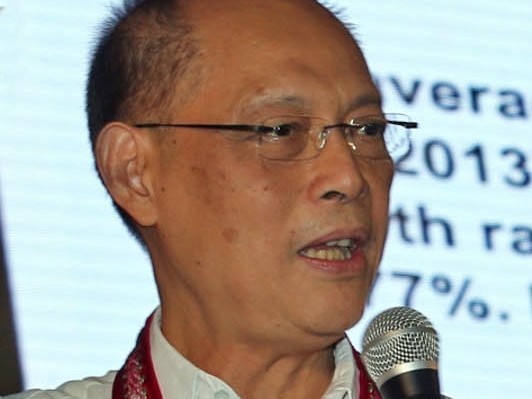The proposed 2017 budget will seek to support the anti-drug policy and increase the public infrastructure spending under the administration of President Rodrigo Duterte — but none of the budget will be spent for Charter change, Budget Secretary Benjamin Diokno said on Monday.
Diokno made this statement after the turn-over of the proposed P3.35 trillion national budget for 2017, which seeks to cement the Duterte administration’s promise of change.
READ: DBM submits P3.35-T ‘budget for change’ for 2017
“(The budget) will allow us to address the backlog in public infrastructure and the needs of the Filipino people for higher spending for education and health, social welfare, and to address the requirements of the President to pursue peace and order and anti-drug policy in the Philippines,” Diokno said in an open forum with Speaker Pantaleon Alvarez and appropriations chair Davao city Rep. Karlo Nograles.
Diokno said to support the drug war, the budget for the Philippine National Police would be increased to P110.4 billion, or 24.6 percent higher than its 2016 budget, for the national police force to hire more personnel and buy more guns and patrol vehicles to intensify its suppression of criminality.
Meanwhile, the proposed budget for the Armed Forces of the Philippines is P130.6 billion, or 15 percent higher than the 2016 budget, to complement the AFP Modernization Program, under which P25 billion was allocated to better equip soldiers for counter terrorism, Diokno said.
To address the increasing number of drug users surrendering to the police, the 2017 budget will also cover additional hospitals for rehabilitation, and another rehabilitation center, Diokno added.
However, Diokno said the proposed 2017 budget would not include any expenses for Charter change should Congress convene to revise the 1987 Constitution in a bid to pave the way for a shift to a federal system from a unitary form of government.
Diokno said there would be no expenses in the conduct of a Constituent Assembly, President Duterte’s choice of Charter change where Congress would convene to amend the Charter.
But should the administration opt for a Constitutional Convention, where delegates would be elected to amend the Charter, the budget would be sourced from the contingency fund, while the election of delegates would be synchronized with the barangay elections, Diokno said.
“There is no budget for Charter change here, but as you know, the preference of the President is Con-ass. That does not involve additional expenses. If we can get it from the contingency fund, if you elect the delegates, as proposed to be synchronized with the barangay captains, you don’t need additional budget for that,” Diokno said.
Diokno said the department had abolished the bottom-up budgeting of the previous administration but this does not mean the present administration would not serve the poorest municipalities and provinces.
Diokno said the lump sum funds would mostly come from the special purpose funds, which refer to calamity funds, contingency funds, miscellaneous personnel benefit funds, pension and guarantee funds, the Internal Revenue Allotment (for local government units), debt service or interest payments.
Finally, Diokno denied reports that another form of pork barrel is inserted in the budget, after the Supreme Court scrapped the congressional lump sum Priority Development Assistance Fund (PDAF) at the height of the Janet Lim-Napoles pork barrel scam.
He said there is no truth to reports each representative was allotted P80 million worth of projects in the proposed budget, but each lawmaker may request for projects based on the needs of their constituents.
“It is the right of a congressman to request for what’s good for their constituents… Between, for example, a district engineer and a congressman, I would rather give the congressman the right to request and identify some projects. The district engineer is not elected, the congressman is elected. It’s just proper to give them credit when they request,” Diokno said.
“There is no hard and fast rule. Congressmen would identify P100 million worth of projects but they are not eligible… Somebody identifies projects which are worthwhile, consistent with the desire of the President for the development of the countryside, we will of course consider,” Diokno added. JE/rga
